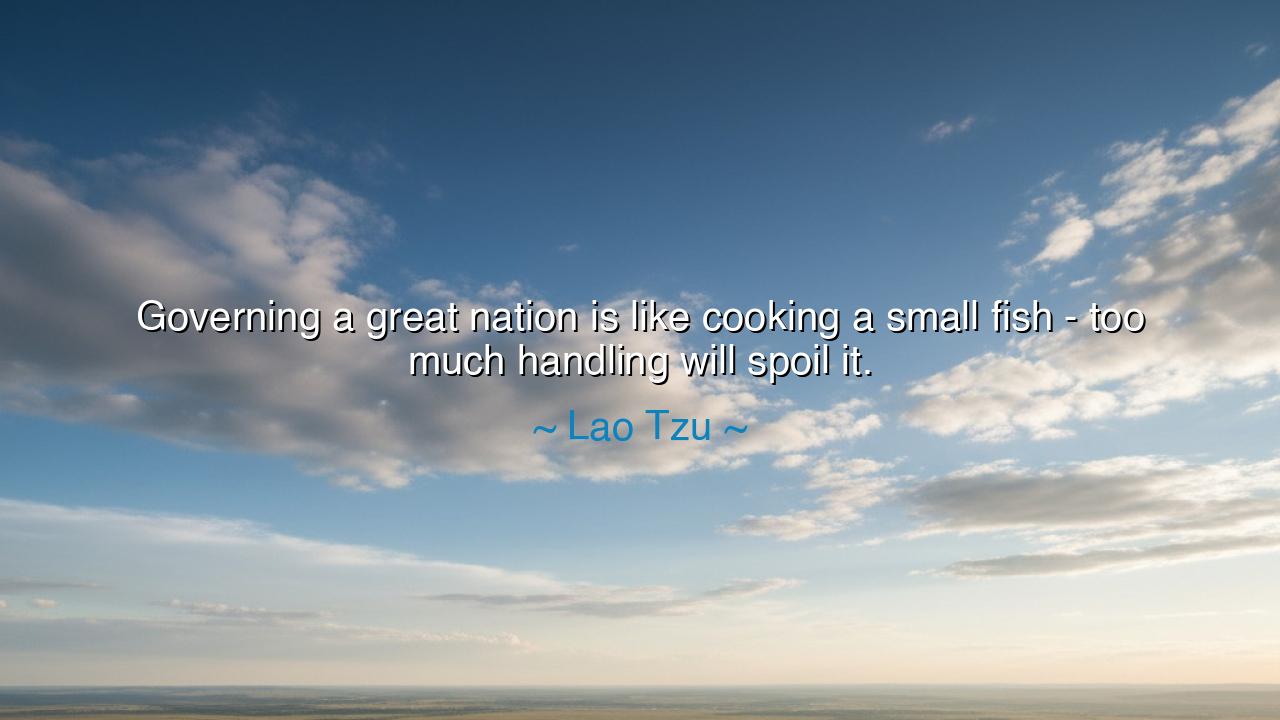
Governing a great nation is like cooking a small fish - too much
Governing a great nation is like cooking a small fish - too much handling will spoil it.






The ancient sage Lao Tzu, father of Taoist wisdom, once said: “Governing a great nation is like cooking a small fish – too much handling will spoil it.” Within these simple words lies a philosophy as deep as the Tao itself—a teaching not only for rulers, but for every soul that seeks to guide, nurture, or lead. In the stillness of his thought, Lao Tzu saw that power is most perfect when it is gentle, and leadership most effective when it interferes least. Just as a small fish falls apart when stirred too much in the pan, a nation—or a person’s life—disintegrates when controlled with an anxious hand.
To understand this, one must first know the heart of Taoism: that life moves best when it moves in harmony with its own nature. The wise ruler, like the skilled cook, knows when to turn the fish and when to leave it be. He trusts the flame of the people’s spirit, adjusts only what must be adjusted, and refrains from meddling beyond necessity. The Tao teaches that the more laws, decrees, and punishments a ruler imposes, the more chaos he creates. Interference breeds resistance; control breeds rebellion. Thus, to govern well is to govern lightly, with patience, humility, and faith in the natural order of things.
History provides many examples of this truth. Consider the reign of Emperor Wen of Han, one of the most enlightened rulers of ancient China. He ruled with simplicity, lowering taxes, reducing punishments, and avoiding wars. Many at the time saw him as weak, but under his “light touch,” the empire flourished in peace and prosperity for decades. His rule mirrored Lao Tzu’s wisdom: he did not crush his people with decrees, nor burden them with fear. He governed as one tending a delicate fire—feeding it just enough to sustain its glow. In contrast, later emperors who sought to control every aspect of their subjects’ lives plunged the dynasty into disorder and revolt. The small fish, once handled too often, fell to pieces.
Lao Tzu’s teaching extends beyond kings and governments. It applies to every realm of human interaction—families, friendships, communities, and even the governance of one’s own heart. The parent who constantly corrects and scolds their child out of fear will raise rebellion, not respect. The leader who micromanages his followers will extinguish their creativity. Even the soul that tries too hard to control its own destiny—forcing every outcome, fearing every mistake—will find only turmoil. Wisdom lies in restraint. To rule wisely is to trust the strength of what already exists, and to act only when necessary.
There is a story told of George Washington, who, after leading America to independence, voluntarily stepped down from power. Many wished to make him king, yet he refused. He knew that the new nation needed space to breathe, to find its own rhythm. In doing so, he embodied Lao Tzu’s truth centuries before the East and West could meet in thought: that freedom grows best when not constantly gripped by authority. Washington understood that overhandling a fledgling democracy would smother it before it could mature. His restraint gave birth to one of history’s enduring republics.
The emotional heart of Lao Tzu’s teaching beats with humility. To govern—or to lead—requires not pride, but trust. The greatest strength of a ruler lies not in the force of his will, but in the calm of his wisdom. Like a river shaping the valley through gentle persistence, the wise leader shapes his nation through non-interference, guiding by example rather than decree. He governs through stillness, allowing others to move freely within his peace.
In our time, when leaders, parents, and individuals often mistake busyness for virtue and control for competence, Lao Tzu’s words return like a quiet bell in the wind: “Too much handling will spoil it.” The message is not a call to passivity, but to balance—to act when needed, and to refrain when not. True power does not shout; it listens. It does not tighten its grip; it opens its hand.
So, my child of tomorrow, remember this: whether you rule a nation, guide a team, or tend your own heart, do not disturb the harmony of what already flows well. Learn when to act, and when to trust. The world, like the small fish, will cook itself to perfection if handled with patience and care. This is the art of Tao, the art of governing without breaking, and the eternal secret of peace.






AAdministratorAdministrator
Welcome, honored guests. Please leave a comment, we will respond soon